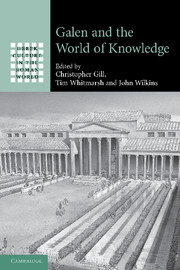Book contents
- Frontmatter
- Contents
- Notes on contributors
- Note on conventions
- Preface
- Introduction
- 1 Galen's library
- 2 Conventions of prefatory self-presentation in Galen's On the Order of My Own Books
- 3 Demiurge and Emperor in Galen's world of knowledge
- 4 Shock and awe: the performance dimension of Galen's anatomy demonstrations
- 5 Galen's un-Hippocratic case-histories
- 6 Staging the past, staging oneself: Galen on Hellenistic exegetical traditions
- 7 Galen and Hippocratic medicine: language and practice
- 8 Galen's Bios and Methodos: from ways of life to path of knowledge
- 9 Does Galen have a medical programme for intellectuals and the faculties of the intellect?
- 10 Galen on the limitations of knowledge
- 11 Galen and Middle Platonism
- 12 ‘Aristotle! What a thing for you to say!’ Galen's engagement with Aristotle and Aristotelians
- 13 Galen and the Stoics, or: the art of not naming
- Bibliography
- Index
9 - Does Galen have a medical programme for intellectuals and the faculties of the intellect?
Published online by Cambridge University Press: 06 August 2010
- Frontmatter
- Contents
- Notes on contributors
- Note on conventions
- Preface
- Introduction
- 1 Galen's library
- 2 Conventions of prefatory self-presentation in Galen's On the Order of My Own Books
- 3 Demiurge and Emperor in Galen's world of knowledge
- 4 Shock and awe: the performance dimension of Galen's anatomy demonstrations
- 5 Galen's un-Hippocratic case-histories
- 6 Staging the past, staging oneself: Galen on Hellenistic exegetical traditions
- 7 Galen and Hippocratic medicine: language and practice
- 8 Galen's Bios and Methodos: from ways of life to path of knowledge
- 9 Does Galen have a medical programme for intellectuals and the faculties of the intellect?
- 10 Galen on the limitations of knowledge
- 11 Galen and Middle Platonism
- 12 ‘Aristotle! What a thing for you to say!’ Galen's engagement with Aristotle and Aristotelians
- 13 Galen and the Stoics, or: the art of not naming
- Bibliography
- Index
Summary
This discussion was prompted by a colleague who asked me recently whether there was a branch of medicine for intellectuals in antiquity. My initial response, before I knew the reason for his question, was ‘no’. Some time later, as I continued to ponder the question, I asked him why he had put it to me. He replied that it arose from the De Triplici Vita of Marsilio Ficino. The first of Ficino's three books is entitled, Primus de uita sana, sive de cura ualetudinis eorum, qui incumbent studio litterarum (Book One, On the Healthy Life, or On Preserving the Health of Those Who Study Literature). Since Marsilio Ficino, the son of a famous doctor, was familiar not only with Plato but also with Galen, two philosophers whose authority he appeals to in the preface of his De Triplici Vita, I became interested in discovering how far one can talk of a branch of medicine for the intellectual faculties in Galen, or for those who embody these faculties, namely intellectuals.
This line of enquiry falls on the borderline between the study of education or training and of therapy in its more familiar or conventional forms. There is, of course, a rich body of ancient theory about the training of the intellect, above all, Plato's elaborate educational programme in the Republic centred on a combination of mathematics and dialectic (Book 7, 521c–540c).
- Type
- Chapter
- Information
- Galen and the World of Knowledge , pp. 190 - 205Publisher: Cambridge University PressPrint publication year: 2009
- 3
- Cited by

